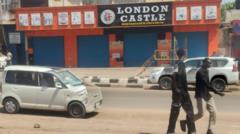Shops and restaurants were shuttered in much of Juba, the capital of South Sudan, as the police announced a nightly curfew aimed at restoring order after a series of aggressive actions against Sudanese nationals. Recent clashes, which reportedly left three people dead and seven injured—including encounters with security officers—highlight the tension in the relationship between South Sudanese and Sudanese immigrants.
In the northwestern town of Aweil, several homes belonging to Sudanese individuals were reportedly set ablaze. The police chief, Insp Gen Abraham Manyuat Peter, announced the curfew, which prohibits movement between 18:00 and 06:00 local time, stating it aims to prevent further violations of both public and private property. Within Juba, police rescued 45 Sudanese traders who are currently being provided protection at a police station.
The ongoing conflict in Sudan has driven increasing numbers of Sudanese nationals into South Sudan, where the humanitarian situation has rapidly deteriorated. According to the UN, nearly half of Sudan's population—approximately 25 million—are in urgent need of humanitarian assistance as the conflict escalated in April 2023.
Recent allegations involving Sudanese soldiers killing South Sudanese civilians have sparked outrage. Reports from rights groups indicate ethnic-based violence has claimed at least 13 lives within a few days, revealing a troubling pattern of endemic racism against darker-skinned individuals in Sudan. The historical context of such discrimination, dating back to the end of the civil war in 2005, has resurfaced amidst current tensions.
Video footage depicting these brutal incidents has traveled across social media platforms, inciting anger among South Sudanese communities, both domestically and internationally. This outrage culminated in mass retaliatory attacks by young South Sudanese men against Sudanese-owned businesses, leading to further unrest characterized by gunfire during security patrols.
As security measures heighten in the capital, city businesses, including the largest market, Konyo Konyo, have remained closed out of precaution. Meanwhile, reports of similar aggressions emerged from Wau and Tonj, with looting attempts faced by police intervention.
A heavy police presence has been deployed in areas known for their significant Sudanese population to mitigate violence and protect vulnerable residents. While there have been numerous reports of hostility and unrest, independent verification of these claims remains challenging.
This troubling episode emphasizes the fragile state of peace in South Sudan and highlights the repercussions of regional conflicts on local communities. As the situation evolves, continuous monitoring and diplomatic engagement will be crucial to mitigating further violence and fostering an atmosphere of peace.




















